Deck 10: Statistics and Data Presentation
Question
Question
Question
Question
Question
Question
Question
Question
Question
Question
Question
Question
Question
Question
Question
Question
Question
Question
Question
Question
Question
Question
Question
Question
Question
Question
Question
Question
Question
Question
Question
Question
Question
Question
Question
Question
Question
Question
Question
Question
Question
Question
Question
Question
Question
Question
Question
Question
Question
Question
Question
Question
Question
Question
Question

Unlock Deck
Sign up to unlock the cards in this deck!
Unlock Deck
Unlock Deck
1/55
Play
Full screen (f)
Deck 10: Statistics and Data Presentation
1
Which of the following retains the original vital statistics certificate for permanent filing?
A) NCHS
B) State registrar
C) Hospital
D) None of the above
A) NCHS
B) State registrar
C) Hospital
D) None of the above
State registrar
2
Data collected from births, adoptions, marriages, divorces, deaths, and fetal deaths are all considered:
A) Registers of events
B) Vital statistics
C) Public health statistics
D) Epidemiological data
A) Registers of events
B) Vital statistics
C) Public health statistics
D) Epidemiological data
Vital statistics
3
Which is a measure of dispersion that is computed by taking the square root of the variance, thereby demonstrating how the values are spread around the mean?
A) Mode
B) Median
C) Range
D) Standard deviation
A) Mode
B) Median
C) Range
D) Standard deviation
Standard deviation
4
When two groups have very different means, it is best to compare their:
A) Standard deviation
B) Mean
C) Median
D) Coefficient of variation
A) Standard deviation
B) Mean
C) Median
D) Coefficient of variation

Unlock Deck
Unlock for access to all 55 flashcards in this deck.
Unlock Deck
k this deck
5
What is the major difference between the gross and net autopsy rates?
A) Net autopsy rate excludes unautopsied coroner's cases.
B) Gross autopsy rate excludes unautopsied coroner's cases.
C) Gross autopsy rate excludes inpatient deaths.
D) Net autopsy rate excludes inpatient deaths.
A) Net autopsy rate excludes unautopsied coroner's cases.
B) Gross autopsy rate excludes unautopsied coroner's cases.
C) Gross autopsy rate excludes inpatient deaths.
D) Net autopsy rate excludes inpatient deaths.

Unlock Deck
Unlock for access to all 55 flashcards in this deck.
Unlock Deck
k this deck
6
A sample is a subset of a population that is valid if it is a true representation of:
A) The population
B) The subset
C) The mean of the sample
D) The median of the population
A) The population
B) The subset
C) The mean of the sample
D) The median of the population

Unlock Deck
Unlock for access to all 55 flashcards in this deck.
Unlock Deck
k this deck
7
What was the average length of stay for the following patients: 4, 3, 2, 5, 5, 10?
A) 5.8
B) 4.8
C) 6.0
D) 7.8
A) 5.8
B) 4.8
C) 6.0
D) 7.8

Unlock Deck
Unlock for access to all 55 flashcards in this deck.
Unlock Deck
k this deck
8
Which denominator is appropriate for computing the maternal death rate?
A) Total discharges (including deaths) of all patients
B) Total discharges (including deaths) of obstetrical patients
C) Total deaths of obstetrical patients
D) Total discharges of surgical patients
A) Total discharges (including deaths) of all patients
B) Total discharges (including deaths) of obstetrical patients
C) Total deaths of obstetrical patients
D) Total discharges of surgical patients

Unlock Deck
Unlock for access to all 55 flashcards in this deck.
Unlock Deck
k this deck
9
What is the term for the number of new cases of a disease?
A) Incidence
B) Prevalence
C) Attack rate
D) Spectrum of disease
A) Incidence
B) Prevalence
C) Attack rate
D) Spectrum of disease

Unlock Deck
Unlock for access to all 55 flashcards in this deck.
Unlock Deck
k this deck
10
What type of data is weight, height, temperature, pulse, cost, or charges in dollars?
A) Nominal
B) Ordinal
C) Discrete
D) Continuous
A) Nominal
B) Ordinal
C) Discrete
D) Continuous

Unlock Deck
Unlock for access to all 55 flashcards in this deck.
Unlock Deck
k this deck
11
What is the term for the number of existing cases of a disease?
A) Incidence
B) Prevalence
C) Mortality
D) Morbidity
A) Incidence
B) Prevalence
C) Mortality
D) Morbidity

Unlock Deck
Unlock for access to all 55 flashcards in this deck.
Unlock Deck
k this deck
12
If a hospital has an SMR of 2.53 for a specific DRG, this means that the hospital has a _____% higher mortality for the DRG than was expected.
A) 153
B) 2.53
C) 1.0
D) 50
A) 153
B) 2.53
C) 1.0
D) 50

Unlock Deck
Unlock for access to all 55 flashcards in this deck.
Unlock Deck
k this deck
13
The ranking of variables according to some criterion is called _____ data.
A) Nominal
B) Ordinal
C) Discrete
D) Continuous
A) Nominal
B) Ordinal
C) Discrete
D) Continuous

Unlock Deck
Unlock for access to all 55 flashcards in this deck.
Unlock Deck
k this deck
14
Which statistic is most appropriate to use when describing ordinal or ranked data?
A) Mean
B) Median
C) Mode
D) Standard deviation
A) Mean
B) Median
C) Mode
D) Standard deviation

Unlock Deck
Unlock for access to all 55 flashcards in this deck.
Unlock Deck
k this deck
15
Which statistic represents the number of individuals in a specific category divided by the number of individuals in the category?
A) Rate
B) Percentage
C) Proportion
D) Ratio
A) Rate
B) Percentage
C) Proportion
D) Ratio

Unlock Deck
Unlock for access to all 55 flashcards in this deck.
Unlock Deck
k this deck
16
A type I error is when the researcher:
A) Accepts the null hypothesis when it is false
B) Rejects the null hypotheses when it is true
C) Accepts the alternative hypothesis
D) Both a and b
A) Accepts the null hypothesis when it is false
B) Rejects the null hypotheses when it is true
C) Accepts the alternative hypothesis
D) Both a and b

Unlock Deck
Unlock for access to all 55 flashcards in this deck.
Unlock Deck
k this deck
17
What is the major disadvantage of the range?
A) Based on ordinal data only
B) Based on percentages
C) Based on extreme values and ignores all other values
D) Based on small values and ignores all other values
A) Based on ordinal data only
B) Based on percentages
C) Based on extreme values and ignores all other values
D) Based on small values and ignores all other values

Unlock Deck
Unlock for access to all 55 flashcards in this deck.
Unlock Deck
k this deck
18
When should the standardized mortality ratio (SMR) be used?
A) When age-specific rates are available
B) When the number of deaths per age category is large
C) When age-specific rates are not available
D) All of the above
A) When age-specific rates are available
B) When the number of deaths per age category is large
C) When age-specific rates are not available
D) All of the above

Unlock Deck
Unlock for access to all 55 flashcards in this deck.
Unlock Deck
k this deck
19
What is an infection called that occurs more than 72 hours after admission?
A) Community-acquired infection
B) Comorbidity
C) Complication
D) Nosocomial infection
A) Community-acquired infection
B) Comorbidity
C) Complication
D) Nosocomial infection

Unlock Deck
Unlock for access to all 55 flashcards in this deck.
Unlock Deck
k this deck
20
When intervals are used in frequency distribution tables, the intervals should be:
A) No less than 5 and no more than 20
B) Of equal width
C) End points that do not overlap
D) All of the above
A) No less than 5 and no more than 20
B) Of equal width
C) End points that do not overlap
D) All of the above

Unlock Deck
Unlock for access to all 55 flashcards in this deck.
Unlock Deck
k this deck
21
In an 800-bed health care facility during the month of January the total inpatient days for adults were 13,500. What was the average daily census?
A) 439.5
B) 435.5
C) 440
D) 453.5
A) 439.5
B) 435.5
C) 440
D) 453.5

Unlock Deck
Unlock for access to all 55 flashcards in this deck.
Unlock Deck
k this deck
22
What kind of data is shown?



Unlock Deck
Unlock for access to all 55 flashcards in this deck.
Unlock Deck
k this deck
23
What is it called when every member of the population has the same chance of being included in the sample and the selection of one member has no effect on the selection of another member?
A) Random sample
B) Type II error
C) Population
D) Type I error
A) Random sample
B) Type II error
C) Population
D) Type I error

Unlock Deck
Unlock for access to all 55 flashcards in this deck.
Unlock Deck
k this deck
24
The average lengths of stay in the intensive care, cardiac care, and intermediate care units were 13, 7, and 4 days, respectively. The three units have seen 18, 10, and 18 patients, respectively. What was the weighted average length of stay?
A) 6.2 days
B) 7.4 days
C) 7.9 days
D) 8.2 days
A) 6.2 days
B) 7.4 days
C) 7.9 days
D) 8.2 days

Unlock Deck
Unlock for access to all 55 flashcards in this deck.
Unlock Deck
k this deck
25
Which of the following should be excluded in computing the net autopsy rate?
A) Death occurring under 48 hours
B) Postoperative deaths
C) Medical examiner deaths that cannot be autopsied
D) None of the above
A) Death occurring under 48 hours
B) Postoperative deaths
C) Medical examiner deaths that cannot be autopsied
D) None of the above

Unlock Deck
Unlock for access to all 55 flashcards in this deck.
Unlock Deck
k this deck
26
Ten patients were discharged from the obstetrical service on May 4 at Rocky Mountain Hospital. The day's stay for each patient was 3, 2, 1, 1, 6, 5, 1, 2, 2, and 4. What was the median day's stay for these patients?
A) 1
B) 2
C) 3
D) 4
A) 1
B) 2
C) 3
D) 4

Unlock Deck
Unlock for access to all 55 flashcards in this deck.
Unlock Deck
k this deck
27
The number of medications a person is taking is an example of ordinal data.

Unlock Deck
Unlock for access to all 55 flashcards in this deck.
Unlock Deck
k this deck
28
Referring to the information in below, complete the table for the data shown.



Unlock Deck
Unlock for access to all 55 flashcards in this deck.
Unlock Deck
k this deck
29
Ten patients were discharged from the obstetrical service on May 4 at Rocky Mountain Hospital. The day's stay for each patient was 3, 2, 1, 1, 6, 5, 1, 2, 2, and 4. What was(were) the mode(s) for these patients?
A) 1
B) 2
C) 1 and 2
D) 3
A) 1
B) 2
C) 1 and 2
D) 3

Unlock Deck
Unlock for access to all 55 flashcards in this deck.
Unlock Deck
k this deck
30
The average length of stay for a patient who was admitted and died on the same day is 1 day.

Unlock Deck
Unlock for access to all 55 flashcards in this deck.
Unlock Deck
k this deck
31
What was the relative frequency for the data in the 10,000-14,999 interval?
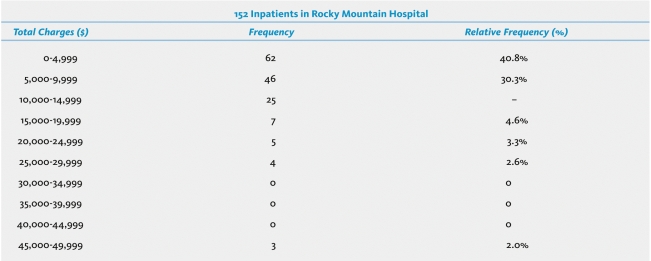


Unlock Deck
Unlock for access to all 55 flashcards in this deck.
Unlock Deck
k this deck
32
In which column is the ratio specified?



Unlock Deck
Unlock for access to all 55 flashcards in this deck.
Unlock Deck
k this deck
33
Ten patients were discharged from the obstetrical service on May 4 at Rocky Mountain Hospital. The day's stay for each patient was 3, 2, 1, 1, 6, 5, 1, 2, 2, and 4. What was the range for these patients' length of stay?
A) 5
B) 4
C) 3
D) 6
A) 5
B) 4
C) 3
D) 6

Unlock Deck
Unlock for access to all 55 flashcards in this deck.
Unlock Deck
k this deck
34
What kind of data is shown?
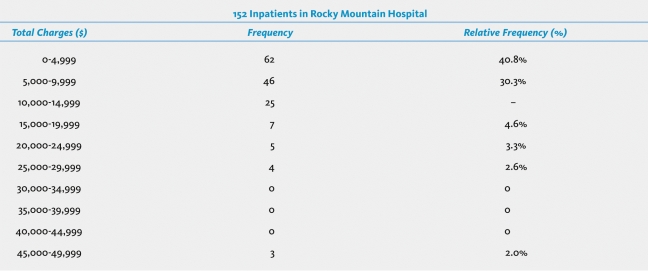


Unlock Deck
Unlock for access to all 55 flashcards in this deck.
Unlock Deck
k this deck
35
Which fiscal agent provided more covered care for females than for others?



Unlock Deck
Unlock for access to all 55 flashcards in this deck.
Unlock Deck
k this deck
36
What is the mean LOS for patients having community-acquired viral pneumonia?
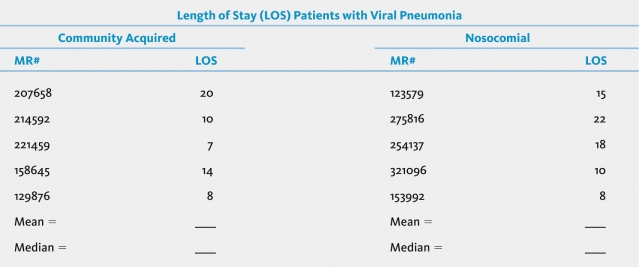


Unlock Deck
Unlock for access to all 55 flashcards in this deck.
Unlock Deck
k this deck
37
In an 800-bed health care facility during the month of January the total inpatient days for adults were 13,500. What was the percentage of occupancy?
A) 54.9%
B) 54.4%
C) 60%
D) 55.4%
A) 54.9%
B) 54.4%
C) 60%
D) 55.4%

Unlock Deck
Unlock for access to all 55 flashcards in this deck.
Unlock Deck
k this deck
38
The standard deviation is the most common measure of variation and is represented by the symbol S.

Unlock Deck
Unlock for access to all 55 flashcards in this deck.
Unlock Deck
k this deck
39
Which is the average number of days of service for each inpatient discharged within a given period?
A) Median
B) Inpatient census
C) Average length of stay
D) Occupancy average
A) Median
B) Inpatient census
C) Average length of stay
D) Occupancy average

Unlock Deck
Unlock for access to all 55 flashcards in this deck.
Unlock Deck
k this deck
40
What type of data are these examples: the number of records that are analyzed, the number of patients interviewed in a patient satisfaction survey?
A) Continuous
B) Nominal
C) Discrete
D) Ordinal
A) Continuous
B) Nominal
C) Discrete
D) Ordinal

Unlock Deck
Unlock for access to all 55 flashcards in this deck.
Unlock Deck
k this deck
41
The ____________________ is the difference between the highest and lowest values.

Unlock Deck
Unlock for access to all 55 flashcards in this deck.
Unlock Deck
k this deck
42
What is the median LOS for patients having nosocomial viral pneumonia?
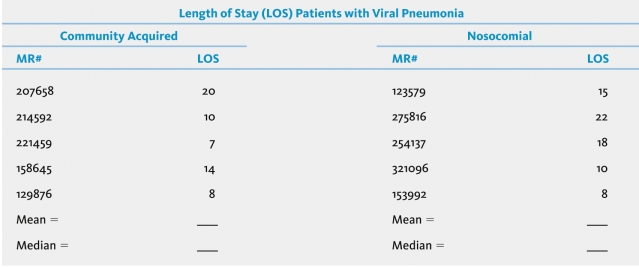


Unlock Deck
Unlock for access to all 55 flashcards in this deck.
Unlock Deck
k this deck
43
Which hospital appears to be located in the suburbs?



Unlock Deck
Unlock for access to all 55 flashcards in this deck.
Unlock Deck
k this deck
44
What kind of data is shown?



Unlock Deck
Unlock for access to all 55 flashcards in this deck.
Unlock Deck
k this deck
45
The ____________________ is the average number of observations.

Unlock Deck
Unlock for access to all 55 flashcards in this deck.
Unlock Deck
k this deck
46
A whole number divided in 100 parts is a ____________________.

Unlock Deck
Unlock for access to all 55 flashcards in this deck.
Unlock Deck
k this deck
47
The _________________________ demonstrates how values are spread around the mean and is the square root of the variance.

Unlock Deck
Unlock for access to all 55 flashcards in this deck.
Unlock Deck
k this deck
48
What data are missing for calculating the weighted mean?
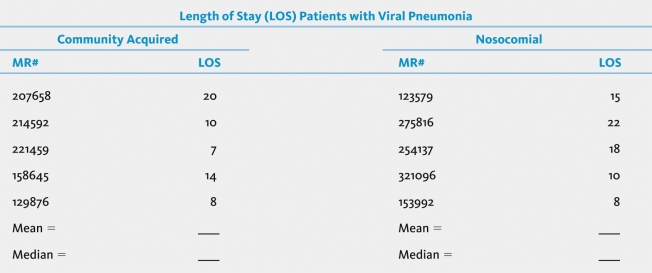


Unlock Deck
Unlock for access to all 55 flashcards in this deck.
Unlock Deck
k this deck
49
The ____________________ denotes the middlemost value when the values are arranged in numerical order.

Unlock Deck
Unlock for access to all 55 flashcards in this deck.
Unlock Deck
k this deck
50
It appears from the information that the leadership perceptions of the majority of students improved as a result of their clinical internship in management. Do you agree or disagree? Explain.



Unlock Deck
Unlock for access to all 55 flashcards in this deck.
Unlock Deck
k this deck
51
What kind of data is shown?



Unlock Deck
Unlock for access to all 55 flashcards in this deck.
Unlock Deck
k this deck
52
What would be the numerator for calculating the incidence rate of cardiovascular disease in the study?



Unlock Deck
Unlock for access to all 55 flashcards in this deck.
Unlock Deck
k this deck
53
Which hospital drew the fewest patients from the city?



Unlock Deck
Unlock for access to all 55 flashcards in this deck.
Unlock Deck
k this deck
54
____________________ is a measure of how often data are classified in the same manner.

Unlock Deck
Unlock for access to all 55 flashcards in this deck.
Unlock Deck
k this deck
55
Which hospital had the fewest admissions for September?



Unlock Deck
Unlock for access to all 55 flashcards in this deck.
Unlock Deck
k this deck


